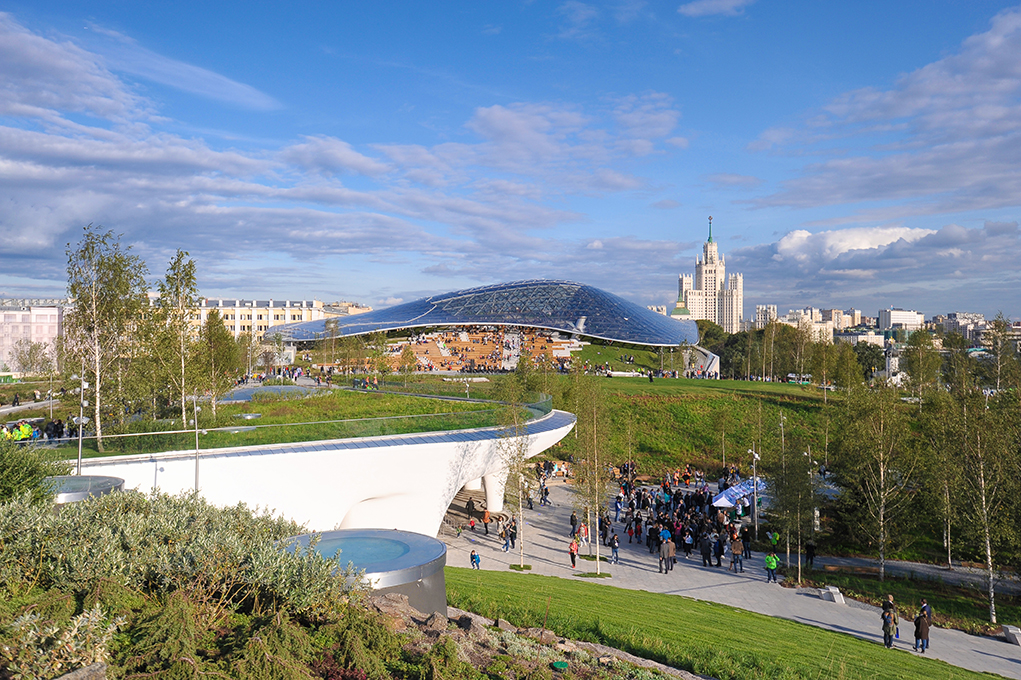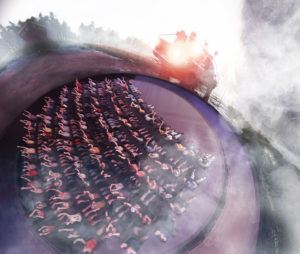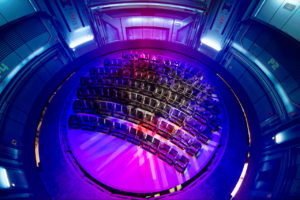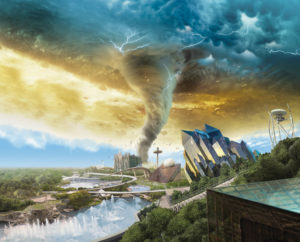The pressure was on when tasked with transforming wasteland into a spectacle of technology and design that would educate and entertain the masses. Charlotte Ashley explores the first public park to be built in Moscow for 50 years.
Spanning 130,000 square metres, you can’t miss the towering dome structure and landscaped spaces of Zaryadye Park, just adjacent to Russia’s iconic Kremlin and Red Square. A project which attracted the attention of architects from around the world back in 2013, now proudly sits as a feat of design and technology integration that can stake a claim to being one of Russia’s most innovative cultural landmarks.
Expectations were high when the Government of Moscow and the Strelka Institute for Media, Architecture and Design put out a call to the design world to create a concept for the park five years ago, following discussions with President Vladimir Putin and the Mayor. Not only was the project to be first major development of this size in Russia for nearly a century, but the site was steeped in history, having previously been home to the “world’s largest hotel,” Rossiya Hotel.
The site was left as a wasteland following the hotel’s demolition, until November 2013 when work began to bring the space back to life, as an international consortium (headed by US studio Diller Scofidio + Renfro) won the competition to design a new urban park. The space was to be transformed with a Concert Hall, Amphitheatre, Media Centre and Conservation Embassy, in addition to themed visitor attractions including ‘Flight over Russia’, ‘Time Machine’ and the ‘Ice Cave’. Another, billed the ‘floating bridge’, extends from the park over the Moskva River, allowing as many as 4,000 visitors to take in the views of the park and the surrounding scenery.

“It looks to absorb all buildings within its planting systems; nature and culture are in balance,” said the studio of its winning ‘Wild Urbanism’ concept – spanning four diverse and characteristically Russian landscapes (northern tundra, steppe, forest and wetlands). Resultantly, a strong focus on sustainability runs throughout the park, with technologies deployed to create seasonally adjusted micro-climates, including simulating daylight at night, as well as supporting year-round use.
“Location, the project’s high visibility and an extremely tight deadline were all pressure factors with the park,” recalls Mikhail Zherokov, head of the multimedia division at integrator Lanit, who partnered with AV specialist Digis to deliver the project, with the assistance of an international team of subcontractors including Austria-based Kraftwerk Living Technologies, who helped deliver the Flight Over Moscow attraction. “We joined the project in mid-2015 when the customer realised that the previous proposal laid out by another company for the multimedia components wasn’t going to work, and was too expensive,” adds Zherokov.
Though secured in part due to Lanit’s reputation in Russia and previous work on government projects, its late arrival to the high-profile installation meant the pressure was on to create something truly special. “The entire project was hosted by government officials including Mayor of Moscow and vice-Mayor who was following the project’s daily progress,” states Zherokov.

Lanit and Digis were tasked with not only delivering a visitor attraction to attract a significant proportion of the 17+ million tourists that visit Moscow each year, but ensuring quality engineering and IT infrastructure was in place underground in just five months. This was in keeping with the project-wide ethos for self-supporting revenue streams that prioritised renewable entertainment rides and flexible event spaces below the park’s greenery, maximising space. “Our vision for when all the underground concrete structures were complete was one of the main reasons we won the project – it was a case of the client saying ‘that’s all we have’ and it being down to us to impress them with how our design would fit into existing areas, whilst still keeping things relatively cheap,” says Zherokov.
AV underpins the experience in all of the park’s main attractions – the media centre, a conservation embassy and a soon-to-be-completed Ice Cave – which both educate and entertain the masses with tales and experiences of Russia’s rich heritage.
Star attractions
The 8,500 square metre area billed a ‘Media Centre’ serves as multiple facilities in one – chiefly an education and education space, but also a tourist centre and ticket office, shop and café. The brief set out to the integration team required the centre support everything from shows and theatre to presentations, lectures and exhibitions when needed.
The walls and floor of the space were also to serve as screens to immerse visitors in relevant interactive content, comprised of 33 55-in Philips LCD panels. Content is generated via SpinetiX media players, with content managed through Elementi X software. A 3×3 videowall information stand can also be transformed into a circular panorama of local attractions by visitors, created using Philips panels in harmony with Christie TVC and Phoenix controllers and a K-array sound system comprised of KK102 loudspeakers and KU36 subwoofers.
Visitors to the centre are greeted with a Moscow Today Welcome Zone showcasing information about the park, city life and upcoming events, supported by five Initium double-sided interactive information kiosks. The area is accompanied by various museum spaces and a children’s television studio. A centre-wide digital signage system assists visitors in navigating the park and points of interest, with a QSC AD-S6TW sound system powering background audio in the pavilion.
The centre is also home to the ‘Time Machine’ – billed as Russia’s first immersive attraction with a cylindrical screen presenting interactive content. Although originally planned to be domed by the client, a curved screen was eventually chosen due to significantly lower content development costs. The ride features a moving platform incorporating three rows of seating to immerse up to 60 people in the tale of the Battle of Borodine, the 1812 fire of Moscow, and more, through panoramic projection, multi-channel sound and water-sprayers, wind-generators, smoke and scents. Equipment to deliver the full 4D effect is accompanied by tracking, fire suppression and ventilation systems.
Fulfilling the brief was far from straightforward however, in part due to having to complete construction a few weeks before the attraction’s opening, but also due to the ceiling shape and reinforced concrete girders in the space. To solve the challenge the integration team opted for 22 carefully positioned Christie WU12K-M 3DLP projectors combined with a 16.5-metre custom-engineered cylindrical aluminium perforated screen designed, supplied and installed by Kraftwerk.
To minimise the defocus effect when projecting onto the curved surface of the cylindrical screen, the projectors were installed in portrait setting, following lenses being tested and developed with Christie. A further 11 projectors complete the set-up, suspended from a variety of positions on the ceiling to create a floor projection. Images are generated and managed via Christie Pandora’s Box servers (8 Quad and 1 Dual), integrated with a SonicWave Wave I sound processor and an extensive JBL system handling audio, controlled by a QSC matrix. An interface architecture for video presentation sources (including an optional Allen & Heath audio mixing desk) supports the multifunctional nature of the equipment to support hosting different events.
All equipment is deployed behind the wall to eliminate the possibility interference from the multiple power lines present, with video content is transmitted by fibre-optic connection using AMX transceivers. The ride furthermore incorporates a Beyerdynamic Synexis system to support broadcasts for international and hearing-impaired visitors. “Unfortunately, the tracking system deployed created an unexpected effect, whereby the system produced quite a dense flow of TUIO protocol coordinates requiring a certain amount of time to process, resulting in an interactivity delay of approximately two seconds,” adds Zherokov. To solve this problem, it was necessary to rework the programme using a UDP protocol.
Visitors can also joy the visual spectacle that is the ‘Flight over Moscow’ ride at the Media Centre – the park’s most popular attraction. A journey exploring the beauty and breadth of 30 locations across Russia; paying homage to the four nature-scapes chosen outlined by Diller Scofidio + Renfro’s concept and the nearby Red Square. Sightseers’ aerial voyage from the mountains of Russia to the Baltic Sea is brought to life on a 9-metre high parabolic screen and a dynamic platform (set above the screen) that seats 39. Measuring 203 square metres in total, images are projected onto the aluminium perforated screen by three Christie D4K2560 4K projectors with media playback by Brainsalt servers – all of which was installed by Kraftwerk.
“When it comes to the Flight over Russia and Time Machine rides, there is simply nothing else comparable in Russia…”
To fully immerse visitors in Russia’s heritage, the ride’s moving platform is positioned on a 11-metre high sphere supporting 6 degrees of freedom, with a multi-channel sound and a special effects system adding to the simulation of flight. Audio is amplified through a Meyer Sound UPA-1P system and accompanying AC 700-HP subwoofers, with Brainsalt and Meyer Sound’s Galileo 616 processors delivering multi-channel audio. Both the Time Machine and Flight over Moscow were specified to support media content being regularly updated; effectively allowing the park to offer new attractions without replacing any hardware.
“Working on the construction of this ride underground was definitely a challenge,” states Zherokov. “It was located in the room with no outdoor walls and we had to deliver metal structures amounting to 80 tonnes in an extremely short period of time.” The heavy metal structure had to be delivered by air from manufacturer Dynamic Attraction in Canada due to the time-frame, and then navigate the narrow streets of a busy city centre via 12 trucks to get to Moscow. “Working around overseas deliveries and a fairly inconsistent basement construction, we then had to schedule dismounting some of the roof and walls for the hardware,” he adds.
Inside the Ice Cave
The ambition of the Zaryadye Park continued with an attraction that both represents Russia’s Arctic Circle and truly engage visitors’ senses: The Ice Cave. Briefed to create a high spec pavilion where the temperature would be permanently be below zero, the Ice Cave saw 70 tonnes of water combined with extensive AV equipment.
At the heart of the cave’s main hall, the ‘Florarium,’ is a large 1.2mm pixel multipurpose Unilumen LED screen working with Pandoras Box and a customised Stewart Fideledy Vision system – the first use in Russia – works to smooth pixelisation, eliminates moiré effect and protects against possible water damage. A 3×3 videowall constructed from Philips LCD panels highlights the Ice Cave’s bar area, which broadcasts which broadcasts images of the Far North and historical facts. Both wall and display are paired with K-array loudspeakers, with an extra AMX DX-TX-DWP interface architecture and Audio-Technica wireless microphone system on hand to support presentations for events. Each system can be controlled via a 7-in wall-mounted AMX Modero X Series G5 sensor panel. Elsewhere, 15 LCD panels are found in the cave and nearby Conservation Embassy’s’ pavilions – controlled via SpinetiX.
Education hub
The park’s Conservation Embassy serves as a multifunctional space where local state energy agencies and environmental institutions can host educational events for tourists, local schools and college, as well as offering exchange programmes for Moscow University. The centre consists of four teaching auditoriums, including a hall for meetings and academic events and a biology laboratory equipped with photographic equipment and specialist microscopes incorporating built-in cameras connected to displays, amongst other apparatus.
Teaching auditoriums and meeting rooms benefit from Christie DLP projectors, paired with Da-Lite screens, Smart interactive whiteboards and a Cisco SX80 TelePresence system to support collaboration. All of this is tied together with a Christie Brio wireless presentation system; allowing the park to host different events, with interpretation supported via DIS equipment – with wider control and room booking via AMX. The embassy’s large LED screen can also be updated with video cameras and various sensors should management require it to become a platform for interactive installations.
Lanit and Digis also handled the AV for several ride pre-shows, in addition to office spaces and working areas for the park’s employees.
Zaryadye Park attracted over 1 million visitors in its first month following its opening in September 2017, which has since surpassed 4 million. The project was recognised at the 2018 InAVation Awards for its excellence in AV integration in the Leisure & Entertainment/Visitor Attraction category. “I can say with confidence that the concept for Zaryadye has fully lived up to expectations,” says the park’s director, Pavel Trekhleb. “When it comes to the Media Centre, and specifically the Flight and Time Machine rides, there is simply nothing else comparable in Russia in terms of the multimedia systems installed or the high-tech AV/IT features.”
He concludes: “We have received a lot of positive reviews from Moscow residents and tourists. The park is a living organism which will constantly develop and adapt to guests’ priorities.”
Tech-Spec
Allen & Heath dLive S3000
AMX control system, Modero X Series touch panels, fibre modules and switching system
Audio-Technica ATW-3110b radio system
Beyerdynamic Synexis system
Brainsalt media servers
Chief mounts
Christie WU12K-M, D4K2560 & DHD951-Q projectors, Pandora’s Box server and Brio wireless presentation system
Cisco SX80 videoconferencing system
Da-Lite projection screens
Initium screen kiosks
JBL AC AC266 loudspeakers and PRX418S subwoofers
K-array KK102 speakers and KU36 subwoofers
Meyer Sound UPA-1P loudspeakers, 700-HP subwoofers and Galileo 616 system
Philips 55-in LCD displays
Shure DIS audio and congress system
Sonic Wave I 3D sound processor
SpinetiX HMP350 media players
QSC AD-S6T loudspeakers and Core 500i processor
Unilumen LED display
Source: http://bit.ly/2Jgnyzj
Via: InAVate




